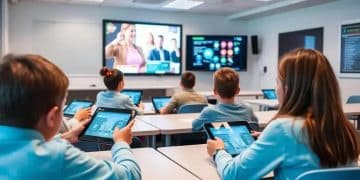Insights on remote learning platforms: what you need to know

Insights on remote learning platforms highlight their benefits, such as flexibility, diverse educational resources, and enhanced communication, while also addressing challenges like technology barriers and student engagement.
Insights on remote learning platforms are becoming increasingly vital in today’s educational landscape. Have you considered how these platforms could transform your learning experience? Let’s explore their potential together.
Key features of effective remote learning platforms
Understanding the key features of effective remote learning platforms can greatly enhance your educational journey. These platforms provide essential tools that facilitate engaging learning experiences.
User-friendly interface
A simple layout is crucial. Users, including students and instructors, should navigate the platform with ease. A friendly interface can make learning less intimidating.
Accessibility options
Accessibility is vital in education. Effective platforms should support students with different needs. This includes screen readers and easy control for navigation, ensuring everyone can participate.
- Multiple device compatibility
- Customizable settings for individual preferences
- Support for various languages
Moreover, a strong focus on content variety enriches the learning process. Whether it’s videos, readings, or interactive quizzes, diverse materials keep students engaged.
Collaboration tools
Another important feature is the provision of collaboration tools. This fosters a sense of community among users. Features like discussion forums or group projects enhance student teamwork.
- Real-time messaging
- Team project areas
- Shared resources and content
In addition, analytics and feedback mechanisms help track progress. Knowing how well students are doing is essential for both learners and educators. Regular updates enable timely interventions when necessary.
Combining these features creates a rich and effective remote learning environment. With the right platform, learning becomes not only easier but also more enjoyable for everyone involved.
Benefits of using remote learning platforms

Exploring the benefits of using remote learning platforms reveals how they can enhance education. These platforms offer flexibility and accessibility for students everywhere.
Flexibility in learning
One major advantage is flexibility. Students can learn at their own pace, which accommodates different learning styles. Whether you’re a night owl or an early bird, you can access materials when it suits you best.
Cost-effective education
Remote learning platforms can also be more affordable than traditional education. Often, they eliminate costs like commuting and housing. This makes acquiring knowledge more accessible for many.
- No commuting fees
- Lower tuition costs
- Access to free resources
Moreover, these platforms often feature a variety of multimedia content. Engaging videos, interactive quizzes, and discussion forums help keep learners interested. This variety aids in retention and understanding of complex topics.
Personalized learning experiences
Another benefit is the ability to customize your learning experience. Many platforms allow users to focus on areas they find challenging. This personalized approach can lead to better outcomes.
- Tailored learning paths
- Adaptive learning technologies
- Regular feedback and assessments
Additionally, students can connect with peers and instructors from around the world. This collaboration broadens perspectives and enriches discussions. Diverse interactions can lead to a deeper understanding of subjects.
Overall, the numerous advantages of remote learning platforms make education more inclusive, enjoyable, and effective for a wide range of learners.
Challenges faced by educators with remote learning
Addressing the challenges faced by educators with remote learning is essential for improving the educational experience. Teachers encounter various obstacles that can hinder effective teaching.
Technology barriers
One significant challenge is the technology barrier. Not all educators have access to reliable hardware and software. This can lead to frustration and difficulty in delivering lessons effectively.
Student engagement
Another issue is keeping students engaged. In a remote setting, distractions can easily pull students away from learning. Educators need to find creative ways to capture attention and maintain interest.
- Interactive content and activities
- Frequent check-ins with students
- Incorporating gamification
Meanwhile, communication can become complicated. Teachers must rely on various online tools to connect with students and parents. Misunderstandings and technical issues can make this even more challenging.
Assessing student performance
Furthermore, assessing student performance in a remote environment can be tricky. Traditional methods of evaluation may not work as effectively. Teachers must explore new assessment strategies to gauge understanding accurately.
- Using online quizzes and polls
- Implementing project-based assessments
- Offering feedback through video responses
Despite these hurdles, many educators are finding ways to adapt and innovate. Developing strong relationships with students and employing varied teaching strategies can help overcome these difficulties.
Tips to enhance your remote learning experience

Implementing some practical tips can significantly enhance your remote learning experience. With the right strategies, students can make the most of their online education.
Set a designated study space
Creating a specific area for studying can help you focus better. A quiet and organized space reduces distractions and signals your brain that it’s time to learn. Make sure it has good lighting and all the materials you need.
Establish a routine
Having a consistent daily routine is crucial. Schedule specific times for studying, completing assignments, and taking breaks. This structure helps to maintain motivation and balance.
- Stick to your scheduled times
- Include regular breaks to refresh your mind
- Set goals for each study session
Moreover, using online tools can support your learning. Many platforms offer resources that make studying more interactive. For instance, using apps for time management or note-taking can enhance productivity.
Engage with your peers
Connecting with classmates is essential. Participate in group discussions and study sessions, even online. Engaging with others can provide different perspectives and clarify concepts.
- Join study groups
- Utilize forums to ask questions
- Collaborate on projects
Lastly, prioritize self-care. Staying healthy physically and mentally plays a big role in learning success. Ensure you’re getting enough sleep, eating well, and taking time for relaxation.
By adopting these tips, you can create a more effective and enjoyable remote learning environment for yourself.
FAQ – Frequently Asked Questions about Remote Learning Platforms
What are the main benefits of using remote learning platforms?
Remote learning platforms offer flexibility, access to diverse resources, and personalized learning experiences, making education more accessible.
How can I stay engaged during online classes?
You can stay engaged by participating in discussions, using interactive tools, and joining study groups with peers.
What technology do I need for effective remote learning?
A reliable device, stable internet connection, and access to learning software or apps are essential for effective remote learning.
How do I overcome challenges with remote learning?
Setting a routine, creating a dedicated study space, and seeking help from instructors or classmates can help you overcome challenges.





